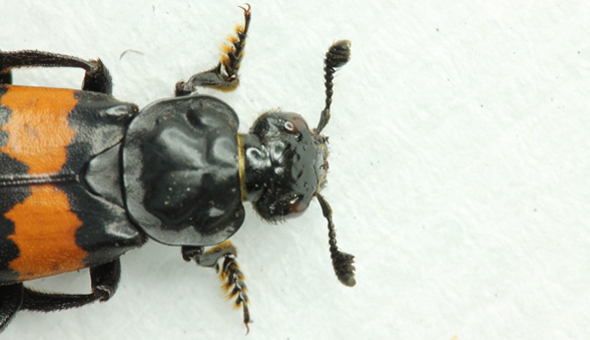
Our work aims to understand how animal behaviour affects evolution.
Does behaviour speed up the pace of evolutionary change or prevent it altogether?
Can the behaviour of one animal cause evolutionary change in a social partner, like its mate or its offspring? What effect does behaviour have on genetic variation?
And how does behaviour contribute to speciation?
Most of our work focuses on burying beetles now, though I retain an interest in avian brood parasites. Part of our research involves running experimental evolution in the laboratory and watching new adaptations evolve in real time. We then map the findings of this work onto wild populations at different woodland sites across Cambridgeshire, to understand how evolution unfolds in nature. We use a range of techniques from genomic analyses to behavioural observations, field work and phylogenetic analysis.
Current research topics include:
-
How parental care contributes to evolutionary change (ERC-funded project and Ben Jarrett’s PhD project)
-
The evolution of beetle-microbe interactions (Royal Society funded project and Swastika Issar's PhD project)
-
The evolution of beetle-mite interactions (Syuan-Jyun Sun’s PhD Project)
-
Stimulation of female fecundity by male burying beetles (Eleanor Bladon’s MPhil project, co-supervisor with Sonia Pascoal)
-
Epigenetics and evolutionary change (Rahia Mashoodh’s BBSRC Future Leaders Fellowship project, in collaboration with Eric Miska)
-
The role of phenotypic plasticity in the adaptive radiation of the Vidua finches (Co-I in collaboration with Claire Spottiswoode, Leverhulme Trust-funded project and Gabriel Jamie’s PhD project)
-
Speciation of the Australian Chalcites cuckoos (Co-I in collaboration with Naomi Langmore, Australian National University, ARC-funded project)
-
Evolution of host defence portfolios (Co-I in collaboration with Øistein Holen, Oslo University, Norwegian Research Council-funded project)
Key Publications
Duarte, A., Welch, M., Swannack, C., Wagner, J. & Kilner, R. M. 2017 Strategies for managing rival bacterial communities: lessons from burying beetles. Journal of Animal Ecology DOI 10.1111/1365-2656.12725
Jarrett, B.J. M., Schrader, M., Rebar, D. Houslay, T. M. & Kilner, R. M. 2017 Cooperative interactions within the family modulate the capacity for evolutionary change in body size. Nature Ecology and Evolution 1:0178
Palmer, W. J. P., Duarte, A., Schrader, M., Day, J. P. & Kilner, R. M., Jiggins, F. 2016 A gene for social immunity in the burying beetle Nicrophorus vespilloides. Proceedings of the Royal Society B 283: 20152733
Kilner, R. M., Boncoraglio, G., Henshaw, J. M., Jarrett, B.J.M., de Gasperin, O. & Kokko, H. 2015. Parental effects alter the adaptive value of an adult behavioural trait. eLife 4: 07340
Schrader, M., Jarrett, B. J. M & Kilner, R. M. 2015. Using experimental evolution to study adaptations for life within the family. American Naturalist 185:610-619
Full list of publications via Google Scholar
